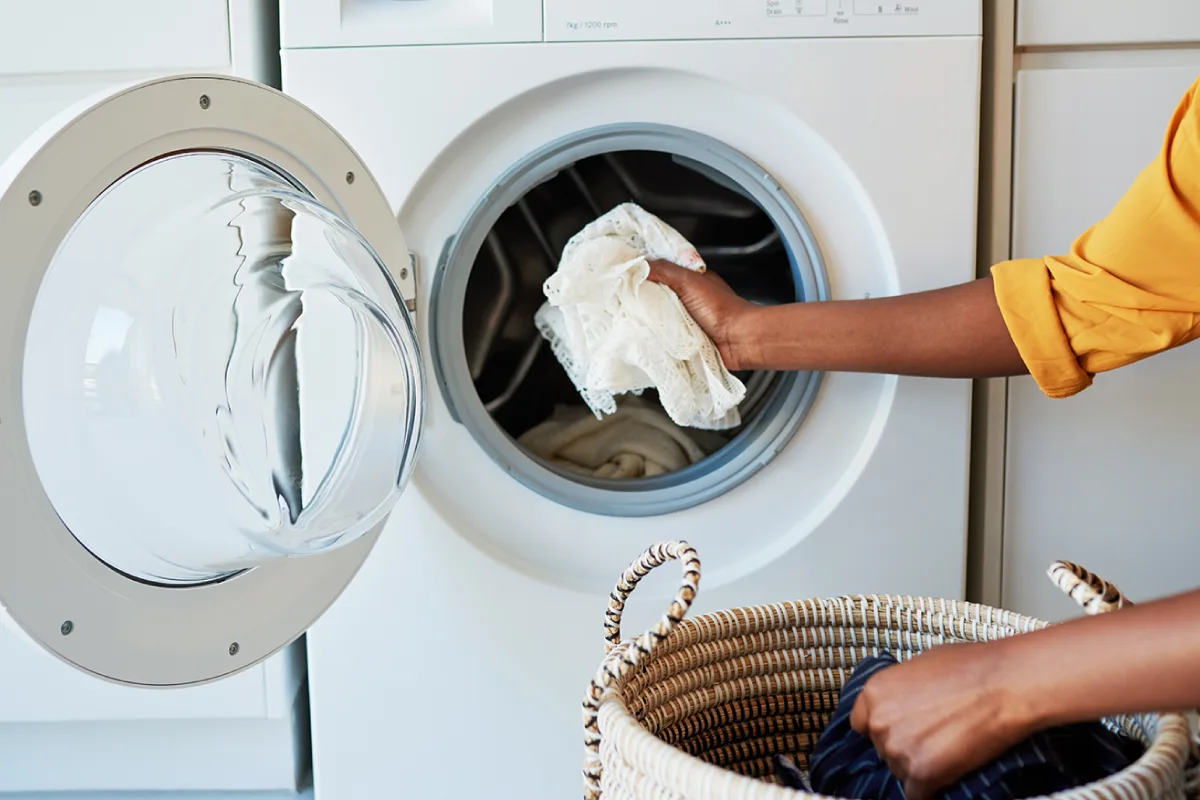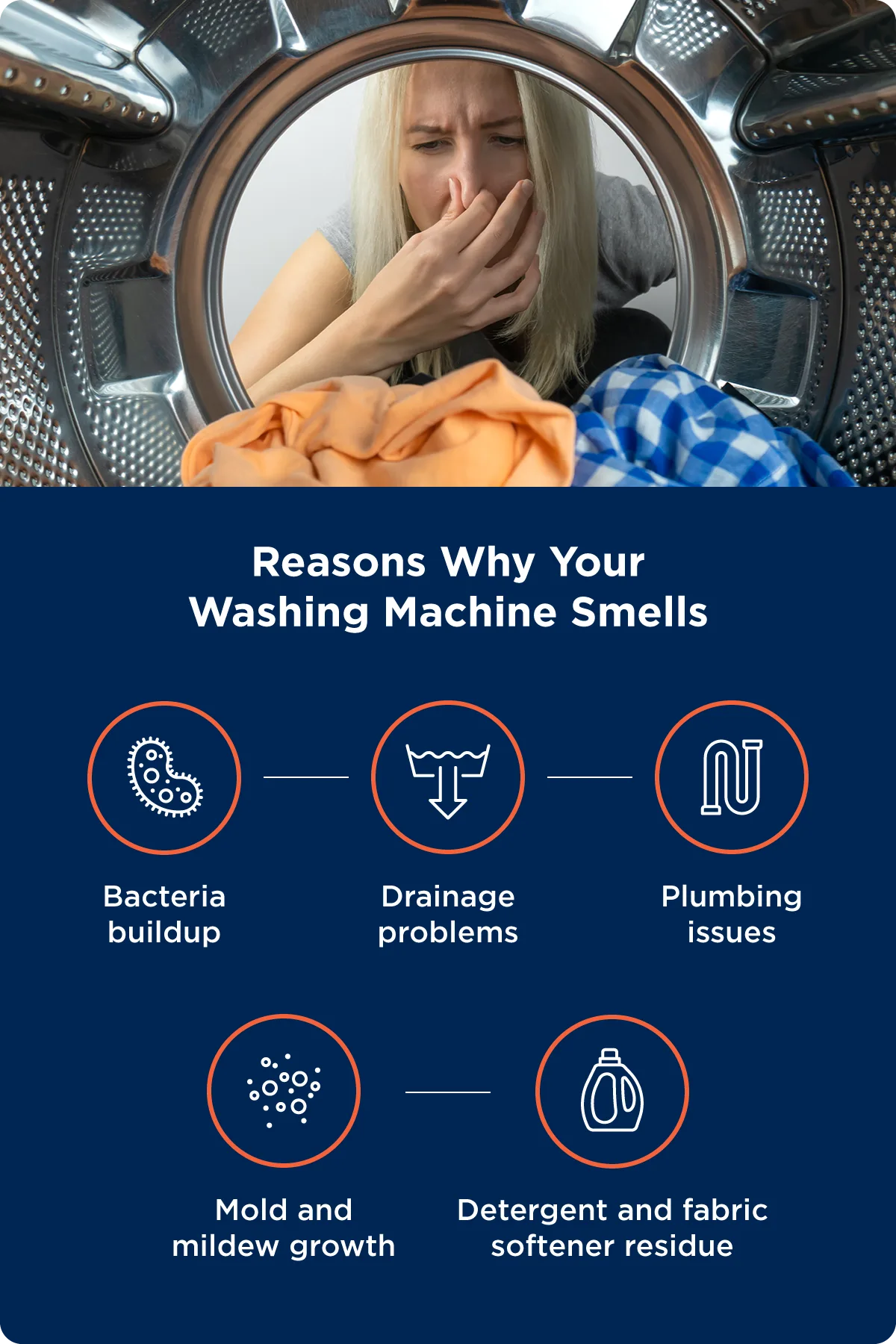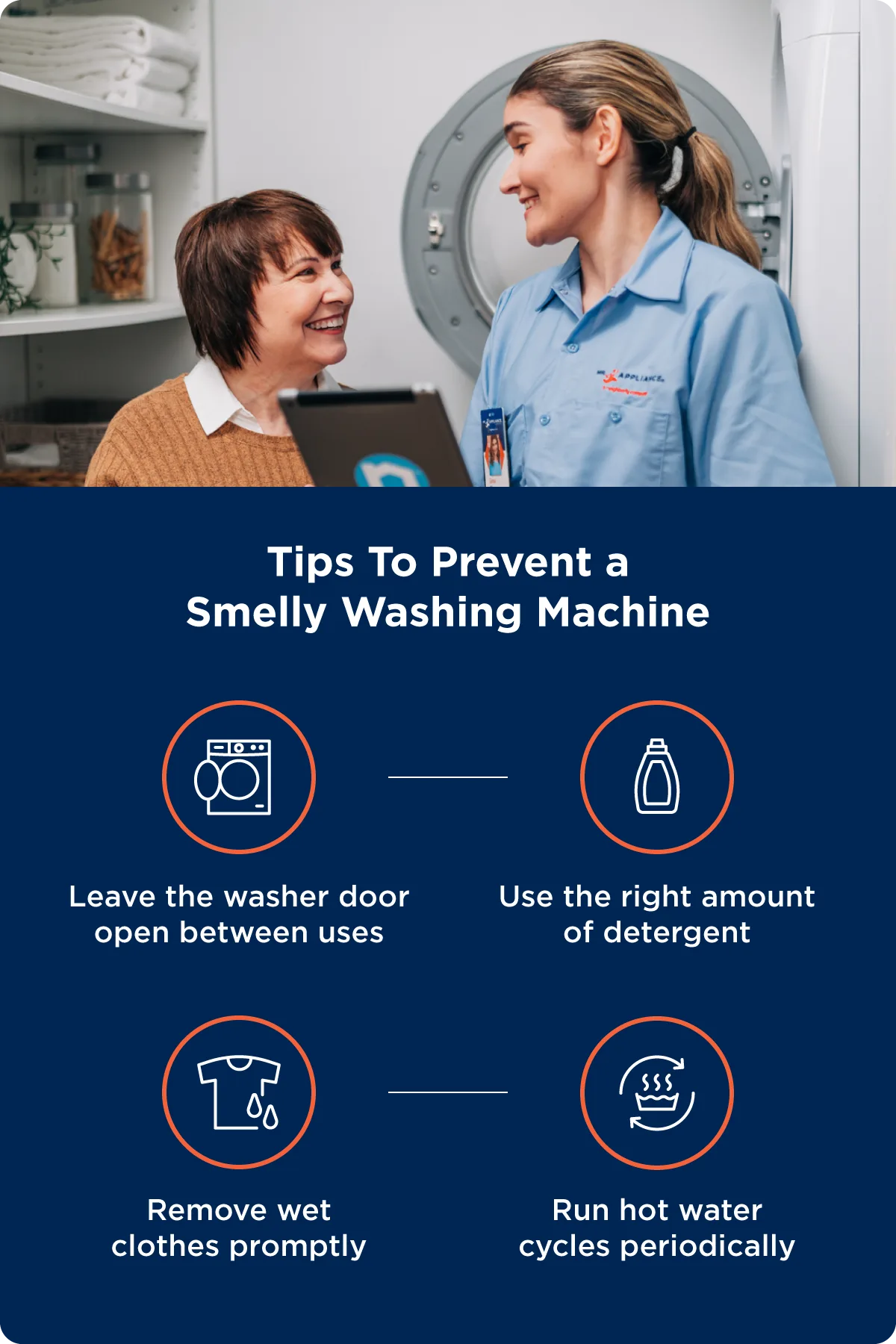Washing Machine Smells and How To Get Rid of Them

To clean a smelly washing machine, start by running a hot wash cycle with a mixture of baking soda and white vinegar to break down grime and neutralize odors. After the cycle, scrub any residue from the gasket, dispensers, and other nooks, and then run another hot rinse to flush out all the cleaning agents. Lastly, leave the door open to air-dry the interior fully, preventing future odor buildup.
- Get Your Materials
- Remove and Scrub Dispensers
- Rinse With Hot Water
- Reasons Why Your Washing Machine Smells
- How To Prevent a Smelly Washing Machine
- Trust Mr. Appliance for Your Washing Machine Services
Did you know that bacteria are introduced into washing machines from dirty clothing, household linens, and incoming water? Bacterial byproducts like mold and mildew are common culprits of washing machine smell, but drainage and plumbing issues in need of repair from water damage can be just as common.
One of the most frequent questions customers ask Mr. Appliance® is, "Why does my washer stink?" Well, your washing machine likely smells bad because of mildew, mold, product buildup, a gas leak, or a plumbing issue that needs to be repaired. Continue reading to learn what’s causing these odors and how to get rid of them.
Step 1: Get Your Materials
First, you’ll need some basic cleaning supplies to tackle the odor in your washing machine. Gather the following:
- Baking soda: Baking soda helps neutralize odors and clean the interior surface without scratching.
- Microfiber cloth or sponge: A microfiber cloth or sponge is gentle enough not to damage the finish on your washer but will be effective in scrubbing away grime
- Bleach: For a deeper clean, especially if you suspect mold or mildew, bleach will be your go-to, as it’s excellent for sanitizing and removing stubborn growths.
- Rubber gloves: Use rubber gloves to protect your hands from any harsh chemicals in addition to opening a window or keeping the room well-ventilated when using bleach
- Cleaning brush: This will come in handy for reaching and effectively cleaning the nooks and crannies, such as the detergent drawer, the fabric softener dispenser, and around the rubber seal where mold and mildew are prone to accumulate.
- Bucket: This will be useful for mixing cleaning solutions or holding hot water for rinsing your cleaning tools.
With these materials at the ready, you’ll be well-equipped to refresh and deodorize your washing machine.
Step 2: Remove and Scrub Dispensers
Over time, your washing machine’s detachable dispensers can accumulate a mixture of old detergent, softener, and water, which can harden or become slimy, creating an ideal environment for bacteria and mold to thrive. Periodic thorough cleaning can prevent this. Here’s the best way to maintain your dispenser:
- Remove dispensers: Take out all soap, bleach, and fabric softener dispensers. These areas can collect old detergent, softener, and stagnant water, leading to hard or slimy buildup where bacteria and mold can flourish.
- Soak and scrub: Soak the dispensers in a mix of hot water and vinegar or bleach to loosen the residue. After a 15- to 20-minute soak, use your cleaning brush to scrub the dispensers, focusing on crevices and hard-to-reach spots.
- Rinse and dry: Rinse each piece thoroughly with warm water to remove any remaining cleaning solution and debris. Ensure each dispenser is completely dry before placing it back into the machine to prevent additional moisture, which could lead to more odors.
Regular washing machine maintenance of these components is a simple yet effective way to prevent smells from returning, ensuring your washing machine remains fresh and operates efficiently.
Step 3: Sanitize With a Cleaning Solution
Sanitizing your washer is an essential part of appliance maintenance. Whether you have a front-load or top-load machine, there are a variety of cleaning solutions you can use, like baking soda or bleach. Here’s how to sanitize your washing machine with different types of cleaners:
Baking soda and vinegar:
- For both top-load and front-load washers, start by adding 1/4 cup of baking soda directly into the washer drum.
- Then, pour 2 cups of white vinegar into the detergent dispenser. Run a hot wash cycle without any laundry.
- This natural mixture will fizz and bubble, which helps break down residue and eliminate odors without leaving any harmful chemicals behind.
Bleach:
- For front-loaders, place 1/2 cup of bleach in the bleach dispenser. For top-loaders, add 1 cup of bleach directly into the washer drum.
- Run a long, hot wash cycle. Use the machine’s “clean washer” cycle if it's available.
- Remember never to mix bleach with other household cleaners, especially vinegar, as it can create dangerous fumes.
Step 4: Rinse With Hot Water
After using any cleaning solution, you should thoroughly rinse your washing machine to remove any lingering scents or residues from the cleaning agents. Hot water is useful in this step for the following reasons:
- Residue removal: Hot water (about 140°F) is more effective at dissolving residues left by detergents, softeners, and cleaning solutions. It ensures that any leftover baking soda, vinegar, or bleach is completely flushed out of the washer interior and pipes.
- Eliminating bacteria and molds: The high water temperature helps kill any remaining bacteria or mold spores that may have survived the cleaning process.
- Effectiveness: Heat increases the effectiveness of the cleaning process by loosening any grime or buildup that may have been partially dislodged during the wash cycle. It ensures your washer is as clean as possible before your next load of laundry.
To perform a hot water rinse:
- Front-load washers: Run an additional wash cycle on the hottest setting without any clothes or cleaning solution in the drum.
- Top-load washers: Set your washer to the highest load size to ensure maximum water coverage and run a hot wash cycle empty.
Rinsing your washing machine with hot water not only clears out unwanted cleaning solution traces but also aids in preventing future odor issues by ensuring all components are thoroughly clean.
After cleaning, let your machine dry out completely by leaving the door or lid open, which will prevent the buildup of moisture and any subsequent odors. Additionally, take the time to wipe around the door gasket and the machine’s exterior with a damp microfiber cloth to keep every part of your washer in top condition.

Reasons Why Your Washing Machine Smells
Odors in your washing machine can stem from a variety of sources, and you can usually discern the root of the issues based on the nature of the smell. By identifying these common culprits, you can target the issue more effectively and refresh your washing machine for use.
Here are a few of the most common reasons for a smelly washing machine:
- Mold and mildew growth: A musty, damp scent is often indicative of mold or mildew, which thrives in the moist environment of a washer, especially when it's left closed between uses.
- Bacteria buildup: Bacterial growth can cause a sour or sewage-like odor that emanates from residual detergent, fabric softener, or stagnant water that becomes a breeding ground for microbes.
- Detergent and fabric softener residue: Overuse or misuse of laundry additives can leave behind a strong, chemical-like smell from the residues.
- Drainage problems: The presence of a stagnant water odor can point to issues with the washer's drainage system, which may be preventing water from clearing out properly.
- Plumbing issues: A rotten egg or sewage smell might not be from the washer itself but could be due to plumbing issues, such as backflow problems or trapped gases. These smells often come from hydrogen sulfide gas, a byproduct of bacterial buildup.
After diagnosing the reasons for your washing machine smells, it’s time to look at solutions.
Problem: Your Washing Machine Smells Like Rotten Eggs
Reason: A rotten egg smell coming from a washer can be a sign that microorganisms have built up and released hydrogen sulfide gas. Deep cleaning is usually the solution to this problem. However, the eggy odor may be caused by two other potential problems: a natural gas leak or a sewer issue.
Solution: If you have a gas dryer, the smell may be the result of a leak in the dryer supply line and not your washer. Turn off the gas supply valve to the dryer for now, open a window, and then check out the next section to confirm if you have sewer-related washer smells. If the smell persists and your washer isn’t the culprit, you’ll want to call your gas company to rule out a gas leak.
Problem: Your Washing Machine Smells Like Sewage
Reason: If your washing machine smells like a sewer — with a sulfur and/or human waste odor — it has one of two problems. Either your machine is grimy and bacteria are releasing hydrogen sulfide gas, or you have a plumbing issue causing sewer gas to enter the laundry room.
Solution: The latter problem is dangerous, as sewer gas is both flammable and damaging to your health, so open a window (if you haven’t already) and check for that problem first. Pull the smelly washing machine away from the wall, and pull the drainpipe out of the vertical standpipe.
Take a cautious sniff. If the odor is coming from that location, you likely have one of these plumbing problems that’s allowing sewer gas into your home:
- A failing or clogged washer P-trap
- A clogged washer vent pipe
- A clogged drain
If you’ve identified that the source of the smell is due to a clog, you may be able to clear the line yourself (if it’s a clogged P-trap or vent pipe). However, if you’re dealing with a clogged drain, you may need to call a professional plumber to clear the drain. Once the clog is cleared, the sewage smell should disappear too.
Problem: Your Washing Machine Smells Like Mildew or Mold
Reason: If the problem isn’t due to a clogged drain or leaky gas supply line, that musty scent is likely caused by the growth of microorganisms on the drum or gaskets of your washer. Front-load washing machines are especially prone to this problem.
That’s because heat, moisture, and detergent or fabric softener residue make washers an ideal home for mildew, mold, and bacteria. Without adequate airflow and regular appliance maintenance, this organic matter will result in a detectable odor in the laundry room.
Solution: Begin by wiping down the interior, gasket, and door with a mixture of warm water and vinegar to kill the microorganisms. Then, run a hot wash cycle with 2 cups of vinegar to sanitize the interior, followed by another hot cycle with 1/2 cup of baking soda to neutralize any remaining odors. Ensure you leave the door open between washes to improve airflow and dry out the machine.

How To Prevent a Smelly Washing Machine
Preventing a smelly washing machine is key to your clothes coming out fresh after each wash. By implementing some straightforward maintenance habits, you can prevent unpleasant odors. Here are some practical tips to prevent your washing machine from developing a foul smell:
- Leave the washer door open between uses: Allowing air circulation by leaving the washer door ajar after each use helps dry out the interior and prevent the growth of mold and mildew.
- Use the right amount of detergent: Follow the recommended detergent guidelines found on the detergent product label for each load to avoid excess suds and residue buildup.
- Remove wet clothes promptly: Don't let damp clothes sit in the machine for long periods, as this can quickly lead to musty smells. Transfer them to the dryer or hang them up to dry as soon as the washing cycle has finished.
- Run hot water cycles periodically: Running a hot water cycle occasionally, especially for washing items like towels and bed linens, can help sanitize the machine and break down oils or residues that cold water can't.
1. Run Your Last Load on Hot
To be more energy efficient and protect delicate fabrics, you may be using the washer’s cold water setting for all your laundry. However, it's important to run your last load of the day in hot water to help remove any detergent or dirt residue.
2. Use the Right Laundry Products
Especially if you own a high-efficiency (HE) washing machine, it’s important to use the right detergent, fabric softener, and other products. Check the manufacturer’s recommendations for laundry products, as some units require HE detergent. These products produce fewer suds, resulting in less film left behind at the end of each cycle.
3. Increase Circulation
Proper airflow is needed to dry the interior components of your washing machine. Promptly remove your laundry at the end of the wash cycle, and leave the door open afterward to allow moisture to dissipate. For added protection, install an exhaust fan or dehumidifier in your laundry room to speed up the drying process.
Trust Mr. Appliance for Your Washing Machine Services
While washing clothes may not be one of your favorite things to do, it can become a real chore when you’re dealing with a smelly washer. Whether you have a smelly washer or your machine just needs some TLC, the appliance pros at Mr. Appliance know exactly what to do to keep it smelling good and running smoothly. If your washer or dryer would benefit from an inspection or needs repair, contact your local Mr. Appliance service professional to get the job done right. Just connect with your local team or schedule service online today.
 Click to call
Click to call


